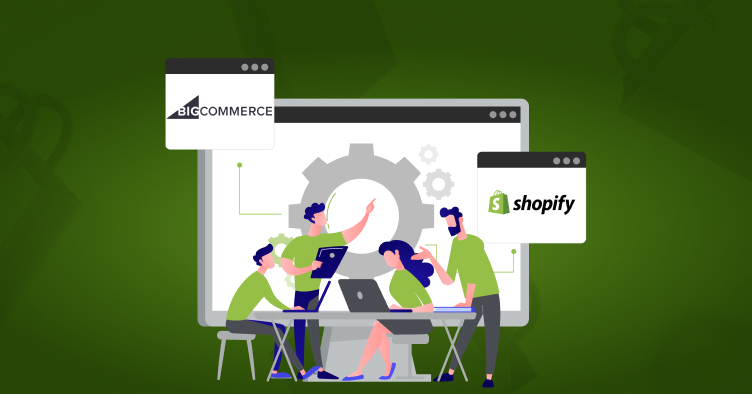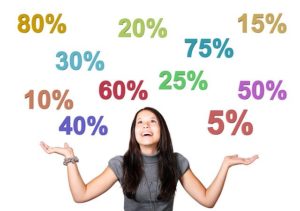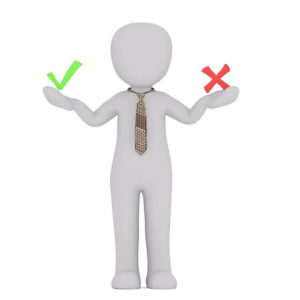BigCommerce vs Shopify – Making the Switch to BigCommerce(2023)
Last Updated | August 30, 2023
Table of Contents
In the previous decade, the demand for software-as-a-service (SaaS) based platforms for eCommerce has increased greatly because of the low cost of ownership, reduced cost of platform management and maintenance, and other various benefits.
One of these popular SaaS-based platforms in mid-market is Salesforce Commerce Cloud, but recently the introduction of BigCommerce and Shopify Plus has challenged its existence. Let’s dive deep into BigCommerce enterprise vs Shopify plus.
Bigcommerce Development Company and Shopify are the two most powerful candidates in the e-commerce market, providing platforms with robust and advanced features, dependable customer support, and designs that are mobile responsive. Both of these platforms are shopping carts and have been in strong competition with each other.
Shopify and Bigcommerce Integration both offer enterprise solutions for businesses that are high-volume. More than 500,000 stores are being hosted over Shopify and they remained successful in generating $46 billion in sales.
Shopify Plus is serving the most prestigious users of Shopify. Its present clients include Leesa, Death Wish Coffee, and Bombas and they are enjoying priority customer service, reliable uptime, unlimited bandwidth, and also a dedicated and exclusive Merchant Sales Manager.
Both of these products can be used for building an online store without the need for coding or designing. There are several templates provided from which you can choose, upload products and their prices and voila!
While it is true that you do not need a web designer in order to build a Bigcommerce App Development or Shopify store, the right choice of design and some attractive pictures of products are also very essential and the key to building a unique online store.
Shopify and BigCommerce, are SaaS (Software as a service) tools, which means that in order to use them, you are required to pay a certain fee, whether monthly or annually, to access the software.
BigCommerce Enterprise has been around for a few years only, it already has already been used by many commercial users including Gibson and Toyota. It offers features like a one-page check-out and filtered search.
BigCommerce Enterprise maximizes the ability of clients to make the conversion of their browsers into potential buyers. However, people are still confused between BigCommerce or Shopify 2020.
Shopify Plus and BigCommerce Enterprise have so much to offer to businesses that are able to generate revenue over $1 million in a year. However, both shopping carts have various similar features and each has its own pros and cons.
As Bigcommerce Support Services is still considered new, it is more popular in North America as compared to Europe. While Shopify Plus is trusted and used globally. BigCommerce has also made a reputation in Australia as this is where it was introduced originally.
The growth of Shopify Plus has been increased as many markets across the globe have adopted it over the last few years including Australia, Germany, France, the United Kingdom and various other regions of key e-commerce.
In the context of a mid-market business-to-customer market, it is evident that Shopify Plus is more popular. It has high volume merchants and bigger brands. Also, it is known to be proven for ‘straightforward retailers’.
Shopify vs BigCommerce: Pricing
Here are BigCommerce vs Shopify Plus pricing plans.
Learn More:
Magento or bigcommerce: Who are the best hosting providers?
Shopify Pricing Plans
Shopify allows you to enjoy a free trial of 14 days which is basically a test drive. This is your chance to become familiar with the platform and discover what amazing features it has to offer.
For signing-up, you do not need any credit card. But after the trial period ends, you are required to purchase a plan in order to continue using it without any difficulties.
Shopify offers different plans to choose from. These plans include:
- Basic Shopify Plan – $29 (per month)
- Shopify – $79 (per month)
- Advanced Shopify – $299 (per month).
There are also some discounts offered, and that is:
- Basic Shopify Yearly Plan Discounts (Shopify Annual Pricing Plan): One year contract at $312 that makes an average of $26 per month. The two-year contract at $558 that makes an average of $23.25 per month. A three-year contract at $783 that makes an average of $21.75 per month.
- Shopify Yearly Discount plan Discounts (Shopify Pricing Plan Annual): One year contract at $852 at an average of $71 per month. The two-year contract at $1,518 that makes an average of $235.00 per month. The three-year contract at $7,884 that averages $219 per month.
- Shopify Advanced Discounts (Shopify Annual Plan Pricing): One year contract at $3,192 at an average of $266 per month. The two-year contract at $5,640 that makes an average of $235.00 per month. The three-year contract at $7,884 that averages $219 per month.
Each of these plans has an unlimited range of products, file storage, and 24/7 customer support.
The good news is that if you are using Shopify Payments, you do not have to worry about transaction fees. However, there is a very small fee of the transaction for Unlimited and Pro users and that is only because of high monthly fee payment.
Remember that you will be required to pay taxes if you live in any of the states where tax collection is defined and made necessary by the law. The fee mentioned here is not representing the added charge for sales tax.
Shopify Plus offers additional features such as hardware integration and staff accounts. Also, it provides Enterprise-grade selling capabilities. This allows big businesses to work with Shopify.
How much is Bigcommerce: Bigcommerce Enterprise Pricing Plans
- Bigcommerce Pricing Plan Standard – $29.95 per month
- Bigcommerce Pricing Plan Plus – $79.95 per month and $71.95 per month if paid annually.
- Bigcommerce Pricing Plan Pro – $249.95 per month and $224.95 per month if paid annually.
Before you make up your mind and decide that Bigcommerce Enterprise Pricing will be your right choice, you are offered a free trial period that is for 15 days. This allows you to try features and tools and see if they are exactly what you have been looking for.
After the trial ends, you will have four pricing options from which you can select the one that suits you. These big commerce plans and pricing include:
Comparing BigCommerce Pricing Plans:
- BigCommerce Pricing Plans Standard – $29.95 monthly. This is the go-to choice of many business owners who have online sales up to $50 thousand per year.
- BigCommerce Pricing Plans Plus – $79.95 monthly. An ideal choice for businesses that have online sales of up to $125 thousand per year.
- BigCommerce Pricing Plans Pro – $199.95 monthly. A great choice for business owners with at least 3 thousand orders per year.
- BigCommerce Pricing Plans Enterprise – It is an order-based custom pricing plan that is tailored specifically for your business’s requirements. This option is perfect for online stores that make online sales of $1 million per year.
Paying annually rather than monthly can help customers to save 10 percent. Each pricing plan has its own set of features. Such as, Standard offers loads of built-in features, Plus offers all Standard features, Pro offers all plus features, and Enterprise offers all pro features.
Each of these plans has a different transaction fee. Pro and Enterprise offer the lowest fee.
BigCommerce Standard and Shopify Basic
The comparison between Shopify Plus and bigcommerce headless commerce can be done by comparing the Shopify Basic Plan ($29 monthly) with BigCommerce Standard ($29.95 monthly). Between them, there is a difference of only 95 cents per month.
Both plans enable you to sell an unlimited amount of products. However, BigCommerce is one step ahead in terms of the offered features.
The BigCommerce Standard Plan offers four prominent things that Shopify Basic does not, these are:
- Gift Cards.
- Professional Reporting Functionality.
- A built-in review and rating system.
- Carrier shipping quotes in real-time.
Speaking of reviews and ratings, Shopify does not offer this feature on any of its pricing plans. So in order to handle this, you will require a separate application. Shopify, fortunately, has an application that is specifically made for this purpose. The name of this app is Product Reviews. You can also install any other third-party application for reviews and ratings that might offer more advanced features as compared to Shopify’s application.
However, there are two important functions that are offered by Shopify Basic, and not by BigCommerce Standard.
One, There is no limit for sales in Shopify Basic. Whereas, BigCommerce Standard has a sales limit of $50,000 yearly.
Two, Shopify Basic offers an Abandoned Cart Saver features that send an email to shoppers who have left your site mid-way through a purchase. This feature is only made available in $79.95 and above the plan.
Shopify vs Big Commerce Transaction Fees
What most users of both Shopify and BigCommerce ask, is that what fees they are paying to these service providers on their transactions.
In this area, BigCommerce fees wins because it does not charge any transaction fee at all. Whereas Shopify charges zero percent only if you use Shopify Payments and not any other payment gateway.
If you are not using Shopify Payments, you will have to pay a certain fee at your every transaction. These are different depending on what type of Shopify pricing plan you are using.
One most important thing to keep in mind is that Shopify only works in specific countries. These are:
Australia, Canada, Denmark, Germany, Hong Kong, Ireland, Itlay, Japan, the Netherlands, New Zealand, Singapore, Spain, Sweden, United Kingdom, and only in Puerto Rico (USA).
If you are not in one of these countries, you will be required to use a third-party payment gateway and to pay transaction fees.
Pros and Cons of Shopify vs Bigcommerce: Credit Card Fee
It is not only a transaction fee that you have to worry about, but also credit card fees. These fees are charged by the software-provider company in order to process card payments of your customer.
If you use an external payment gateway for processing credit card payments, the credit card fees will depend upon the rates of whatever service provider you choose.
However, Shopify and BigCommerce, both offer payment processors that can minimize the fees. Card payment processing will be made easier if you use these options.
In the Shopify vs BigCommerce fees equation, for Shopify, there are Shopify Payments. The fee for a credit card will depend upon whether you are selling in person or online, your location (country), and of course, on your pricing plan.
For BigCommerce, there is a Paypal that is powered by Braintree. The rates of credit cards ranged from 2.2 percent to 2.9 percent, depending on your existing pricing plan.
Pros and Cons of Shopify vs Bigcommerce: Annual Discounts
Both BigCommerce vs Shopify pricing provides a discount of 10 percent if for a year’s service, you are paying up front. But on BigCommerce, this is only available on Pro and Plus plans.
Shopify, however, is one step ahead in this area and provides you a 20 percent discount, if for two years, you are paying up front.
Pros and Cons of Shopify vs Bigcommerce: Annual Sales Limit
Your annual sales will have a maximum limit of $50,000 per year on the BigCommerce Standard plan. On BigCommerce Plus, the limit will be $150,000. And on the Pro plan, the maximum sales limit will be $400,000.
If you are using BigCommerce Enterprise, the sales limit is negotiable and is mentioned as ‘custom’.
BigCommerce or Shopify Cons and Pros: Features
Shopify and BigCommerce both have an amazing, impressive and advanced range of features. They are capable of advertising 99.9 percent uptime, scalability, and unlimited bandwidth. These will keep your traffic driven store from potential crashes at most crucial times.
In the case of BigCommerce vs Shopify 2020, both platforms offer selling capabilities that are multichannel and account managers who guide you while you set up your online store. These Shopping carts offer a similar range of features but there are still some differences among them. Let’s have a look.
BigCommerce or Shopify Cons and Pros: Product Management and Merchandising
Shopify is not ideal for managing product data that is complex and it is because of the nature of tags that is restricted. Also, Custom fields and Meta fields are not fully native. This can be a bit messy as compared to having clear product descriptions, usage, and scope.
BigCommerce allows you to add product attributes. You can assign your product a number, choosing a scope for some already given option. It also allows you to create a set of options which enable you to assign a different set of values against different product groups.
In BigCommerce, custom fields are native and it allows for the creation of data points that are custom that could either support content outputting on the back-end or front-end functions.
BigCommerce is able to handle complex and larger product catalogs. It also provides a variety of options in product filtering, native child-parent category relationship, broad use of price list, and the ability to create rules regarding product options.
These features can be made available on Shopify but it will require an application or customizations.
Visual merchandising is not a specialty of any one of these two. A bigger retailer will use an external solution. Such as:
- Klevu
- SearchSpring
- Algolia
BigCommerce or Shopify Cons and Pros: Focus On Extensibility
When these two platforms are compared, the most important thing to notice is their focus on extensibility.
Shopify Plus has experienced maximized growth due to the nature of the platform i.e. rigid. It minimizes the cost and offers ease to the merchant to perform everyday tasks. The case was similar with BigCommerce a while ago before they put their focus on enabling a specific level of extensibility to their customers, especially on the front-end. BigCommerce seems to be opening up its platform to big retailers who are looking for more output with less effort input. BigCommerce’s APIs are robust and it has room for customization on the front-end.
Shopify Plus also has developed many amazing features even if through external gateways (third-party apps). As compared to BigCommerce, Shopify Plus allows its users to have more experience. Indeed, Shopify is not becoming a complex platform.
But there are some areas where Shopify has done major extensions:
PIM: usage of third party PIM in order to support workflows, product data that is complex, etc.
Internationalization: Shopify Plus partners offer propriety solutions in order to support various aspects of internationalization. Such as workflows, syncing solutions, and scripting, etc.
Shopify Plus vs Bigcommerce Enterprise – Admin, Ease of Use and User Interface
Both of these shopping carts are user-friendly. Their admin interfaces are clean and give intuitive feels.
Shopify, however, has more votes in this area. Its admin interface is more clean and straightforward. The clearly structured options throughout the platform make it easier to use and attractive.
Shopify Plus vs Bigcommerce Enterprise – SEO Flexibility and Control
BigCommerce takes the lead here. The platform is well-optimized and allows its users to have more control over various aspects of the platform that are SEO-focused.
BigCommerce has a lot to offer here:
Freedom with URL: Users are allowed to choose the structure of URLs, involving the ability to make use of parent-child structures. Whereas, Shopify has no room for user-defined directories and all of the pages must be within /products/, /collections/ and /pages/ folders.
Editing of robots.txt file: Users are allowed to make edits in the robots.txt file (within the admin).
Shopify is not a bad platform in terms of giving control, it is not just very flexible as BigCommerce.
Automation
The one most important feature of Shopify that has no comparison yet is ‘Shopify Flow’. It allows for task automation and workflows creation. A good range of features is by Shopify Plus is supported by Shopify Flow and it is bae to integrate with tech partners like DotDigital or LoyaltyLion.
Customer tagging vs Customer Group
Shopify and BigCommerce both allow users to group their customers together and give them control over several aspects of what appears on front-end through customer tags (in Shopify) and customer lists (in BigCommerce).
The customer groups in BigCommerce can be used throughout the platform. Price control, promotions and discounts, credit limits, product visibility, shipping rules and many more things can be done by using this feature.
Shopify Plus offers the same features as customer tags. However, it does not have similar business-to-business abilities built into the main channel of eCommerce.
BigCommerce vs Shopify: Designs and User Experience
First impressions are important. If your visitors leave your site halfway through just because of its unappealing appearance, all your sales features will be of no use. Choosing a design that calls for customer attention is essential.
BigCommerce and Shopify are both eCommerce platforms before they are anything else which means that in terms of design their focus is different from other builders. Such as Wix and Squarespace. To be more precise, they are not design-oriented but sales are driven.
However, Shopify secures high rank i.e. comes at third place in terms of design, after Wix and Squarespace. The important thing is that it beats BigCommerce.
Bigcommerce Shopify Comparison by Themes
Shopify Themes
It has 10 free and 50 paid themes. There is a good range of styles and industries with process varying from $140 to $180. Searching for a perfect theme for your store becomes easier via navigation style, size of store, layout, and more.
Shopify themes are professional and modern. You can easily switch from one to another any time with a little bit reformatting of your content.
Picking a theme that makes the right fit for your business field is very essential. Picking a theme and customizing it for an industry that it was not made for, can be challenging.
However, Shopify allows its users to easily customize themes that are really easy to personalize.
There is a bunch of quality features made available in all themes such as product zoom. These themes are mobile responsive and in order to fit the size of your device’s screen they automatically reformat, and both versions can be edited according to your preference.
BigCommerce Themes
BigCommerce offers 50 paid themes and 12 free themes. These can be filtered by price, layout, and industry. There is a good variety to choose from, but still not too wide as compared to Shopify.
A theme that makes a perfect fit for your industry is very important to represent your business online. However, there is a certain feature that is only offered by specific industry themes. Such as, in order to have a product zoom feature, you will have to choose a theme from the category of ‘clothing’.
Switching themes at BigCommerce is possible anytime and you do not even have to worry about reformatting your content. It will be automatically done. BigCommerce themes fit to tablet and mobile screens.
However, free themes offered by BigCommerce are not as modern as compared to Shopify’s. This is not ideal for the long-term growth of your business. Which means that you will have to switch to a paid theme sooner or later. The price range for paid themes is from $145 to $235.
One most important feature that BigCommerc has is its Store Design feature which allows you to see all the changes that you make, right on your screen, in real-time. This offers you more creative control over your online store and makes the editing of your store easier and less hectic.
Shopify versus Bigcommerce – Which is better Shopify or Bigcommerce
While it is true that BigCommerce is more flexible when switching themes, the design of Shopify is better and serves as an all-rounder. In terms of features, BigCommerce is specific, whereas there are more choices of templates and features in Shopify.
Pros and Cons of Shopify vs Bigcommerce by User Experience
Many people find Shopify easier to use. According to them, Shopify provides an amazing user experience through its user-friendly and straightforward interface.
In contrast, BigCommerce has an editor that causes difficulties in navigation and its language is harder to understand. This is why BigCommerce is not ideal for those who are just beginners. As it requires you to be a little more tech-savvy in order to understand its terminology. And due to this, BigCommerce appears to be 14 percent more difficult than Shopify.
BigCommerce surely has an explanation for this. BigCommerce is more technical due to its strong built-in features and powerful editor.
Compare BigCommerce and Shopify: Extensions
When experts compare Shopify and Bigcommerce both offer an amazing range of features but there is still an added benefit of adding extensions that enable you to do a little extra.
Shopify’s application store has about 500 different applications. Some of these applications are developed in-house and some are developed by third-party as compared to BigCommerce developers. These applications exist for your ease i.e. to provide you with functions that you want to add to your online store to make it more productive and functional.
These extensions include SEO, customer support, fulfillment, integration, social media, customer retention, marketing, optimizing conversions and so much more.
There are many extensions that are free. The premium extensions are from $15 to $50 monthly.
Bigcommerce in Bigcommerce vs Shopify equation you get an identical range of extensions in similar categories. There are both paid and free applications in the catalog of BigCommerce.
However, there is less extension in-app store of BigCommerce as compared to Shopify’s app store. BigCommerce offers free extensions as well as paid ones which are from $20 to $50 monthly.
Shopify Bigcommerce Dropshipping: Basic Difference
Dropshipping is basically a method of order fulfillment where you do not keep the items in stock that you are selling. Instead, you simply take the order and send it to the product supplier to deliver it to the client. Your store, this way, becomes a middle man or front-end for someone else’s business.
This business model is preferred by many online retailers because it does not involves a heavy investment to start a store and also there is no need of spending large sums of money on manufacturing or purchasing goods before selling them.
The only flipside is that in the dropshipping marketplace, there is a strong competition and due to this the margins are pretty low. And it can be difficult to find a supplier who is reliable and ethical. Most suppliers provide goods that are manufactured in China and are of very low quality.
In BigCommerce vs Shopify dropshipping equation, there is a balanced situation between both of them. They both support dropshipping. You can use your store to sell goods of a supplier or become a dropshipper for any online retailer. You can do this by installing an application from Shopify or BigCommerce’s app store.
BigCommerce vs Shopify Pros and Cons YouTube Review Influencer Coverage
Let’s look into the bigcommerce vs Shopify review.
Both of these platforms might appear the same when you see them for the first time because they both are eCommerce platforms and shopping carts.
Shopify has been around since 2006 and is still very popular among people. 1 million businesses are using Shopify today. On the other hand, BigCommerce was introduced in 2009 and it has generated more than $17 billion in sales.
BigCommerce is made for supercharging the growth of your store. Its tools are all built-in and keep you from relying on external apps. Whereas Shopify’s app store is its pride and it provides users with all growth-empowering features.
Shopify shows its customers to add only 3 sets of options on each product including material, color, and size. These options are easier to set up but if there are products that have more than three attributes, it can be frustrating.
Whereas, BigCommerce allows for the creation of lists containing product options (up to 250). You can enjoy flexibility if your goods come in colors, all shapes, and sizes.
Shopify versus Bigcommerce- Which is Better?
BigCommerce versus Shopify, which is the one?
There is nothing wrong about picking either one of them. They both offer almost the same pricing and identical features to a certain extent. Though details hold a lot more, it all depends on what you are comfortable with. It is all about preference and familiarity.
Shopify’s third-party ecosystem is more matured. While using Shopify you will be able to access a large community of developers, freelancers, and designers who have vast knowledge about Shopify and its features.
It is a platform that is easier to use for beginners and more specifically if you are someone who is launching an online store for the very first time, Shopify can make it easier for you.
In contrast, BigCommerce provides you a good range of features and you do not even have to go into its app store in order to avail upgrades. If you are someone who wants to tinker at a higher granular level with your online store, your choice might be BigCommerce.
Compare Bigcommerce and Shopify Pros and Cons – Quick Guide
Is Shopify better than BigCommerce?
While there is more flexibility offered by BigCommerce in theme switching, Shopify has a design that calls for attention. It is very clear and straightforward. BigCommerce, in terms of features, is industry-specific, whereas there are more choices of modern templates and advanced features in Shopify.
What are the key differences between BigCommerce and Shopify?
BigCommerce Standard and Shopify Basic both offer you the same limitations and features. However, the one main difference is that BigCommerce has no limitations for the creation of staff accounts, whereas Shopify Basic only offers two. File storage, bandwidth, products are all unlimited.
Is it possible to migrate from BigCommerce to Shopify?
The Import store application of Shopify allows product, customer data, and order migration from Bigcommerce to Shopify. But before importing the data to Shopify, exporting it from BigCommerce is necessary.
Why migrate from Shopify to bigcommerce?
BigCommerce does not limit you from creating more than one staff account. Whereas Shopify’s limit is 2.
Bigcommerce Transaction Fees: The Bigcommerce has no transaction fees at all and there are many more features already present which you will have to get from the app store if you are using Shopify.
Shopify to bigcommerce migration app?
Cart2Cart Store Migration App is very helpful to transfer all your Shopify data to your new BigCommerce store.

























